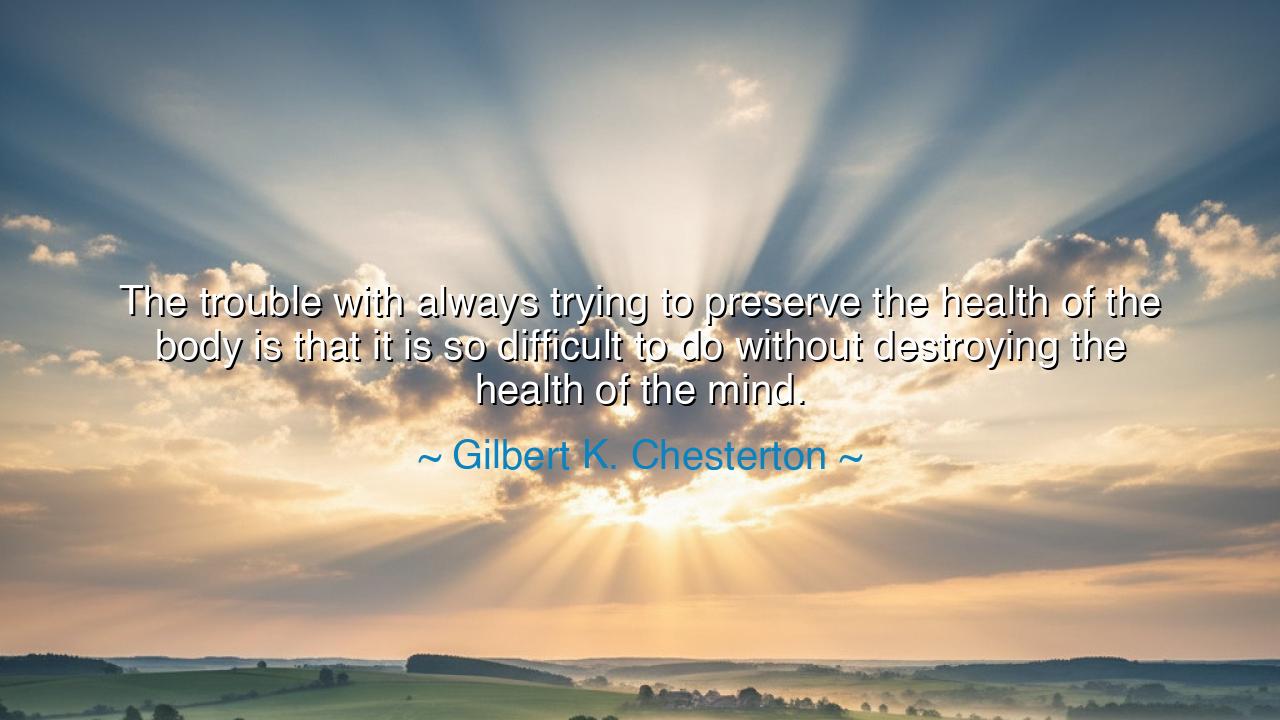
The trouble with always trying to preserve the health of the body
The trouble with always trying to preserve the health of the body is that it is so difficult to do without destroying the health of the mind.






The words of Gilbert K. Chesterton, “The trouble with always trying to preserve the health of the body is that it is so difficult to do without destroying the health of the mind,” are a mirror held up to the modern soul. In them, the great English thinker exposes one of humanity’s oldest paradoxes — that when we worship the body too much, we risk starving the spirit. Chesterton, whose wit and wisdom often struck like lightning upon the moral fog of his age, saw clearly that obsession with physical perfection can lead to spiritual impoverishment. Health, he reminds us, is not an idol to be served at all costs, but a vessel through which life’s deeper purpose flows.
The origin of this quote lies in Chesterton’s lifelong defense of moderation, joy, and common sense against the excesses of both indulgence and asceticism. Writing in the early 20th century, he lived in a world caught between the old religious virtues of restraint and the new secular faith in science and diet. In his characteristic paradoxical way, he warned that the quest to “preserve” health could easily become its opposite: a form of fear masquerading as virtue. For the man who obsesses over every morsel he eats or every breath he takes may indeed prolong his body, but he shortens the reach of his soul. Health ceases to be a blessing when it becomes a burden of anxiety.
To understand Chesterton’s meaning, one must see how he viewed the human person as a whole — body, mind, and spirit bound together in divine proportion. The ancients understood this harmony well. The Greek physician Hippocrates, called the father of medicine, taught that health was the balance of the four humors — yet even he warned that excess attention to regimen could make one “sick with health.” Likewise, the Stoic philosophers cautioned that the wise man cares for his body but never becomes its slave. Chesterton, standing in their tradition, speaks to a truth often forgotten: that to live rightly, one must care for the body without imprisoning the soul within it.
History offers us living parables of this wisdom. Consider the story of Princess Diana, whose beauty and vitality inspired millions, yet whose struggles revealed the torment that can come from the relentless pressure to appear perfect. In pursuit of the flawless image, the mind and heart suffered. But when she turned toward compassion — visiting hospitals, embracing the sick, serving those in need — her radiance changed. It was no longer the radiance of the body alone, but of the soul made luminous by love. She rediscovered what Chesterton meant: that true health cannot exist where the mind is in chains, and true beauty cannot flourish without inner peace.
Chesterton’s insight also reveals the tragedy of a world that prizes image over essence. In our age of diets, mirrors, and endless self-surveillance, how many have forgotten to live joyfully? How many walk through life fearing food, fearing age, fearing imperfection? The body is kept alive, but the heart grows weary; the nerves are taut, but the spirit is dull. This is the destruction of mental health that Chesterton foresaw — a quiet despair born from an endless struggle to preserve what must, in time, fade. He calls us instead to the freedom of balance, where health is not an obsession but an instrument of happiness and service.
To preserve the health of the mind, one must remember the sacred place of delight, faith, and laughter. The mind sickens when it lives in fear; it heals when it lives in gratitude. A walk beneath the sky, a shared meal, a moment of prayer — these are not luxuries, but necessities of the spirit. The body may require bread, but the mind requires meaning. As Chesterton might have said, it is better to live a short life full of joy and courage than a long one ruled by fear and calculation. The goal is not mere survival, but wholeness — to live well, not merely long.
The lesson is clear: care for the body, but nourish the soul. Eat with gratitude, not guilt. Rest when weary, but do not idolize comfort. Exercise not to escape age, but to celebrate life. And above all, remember that the mind’s serenity is the body’s best medicine. A heart that laughs, forgives, and hopes will sustain health more surely than any diet or regimen. Balance is the true secret of longevity — for where body and spirit move in harmony, life itself becomes art.
So let these words of Chesterton be passed down like an ancient prayer for wisdom: seek health, but not at the cost of peace. For the body is but the temple; the mind is the worshipper, and the soul is the flame that lights them both. When all three live in accord, the human being stands radiant — not merely preserved, but truly alive.






AAdministratorAdministrator
Welcome, honored guests. Please leave a comment, we will respond soon